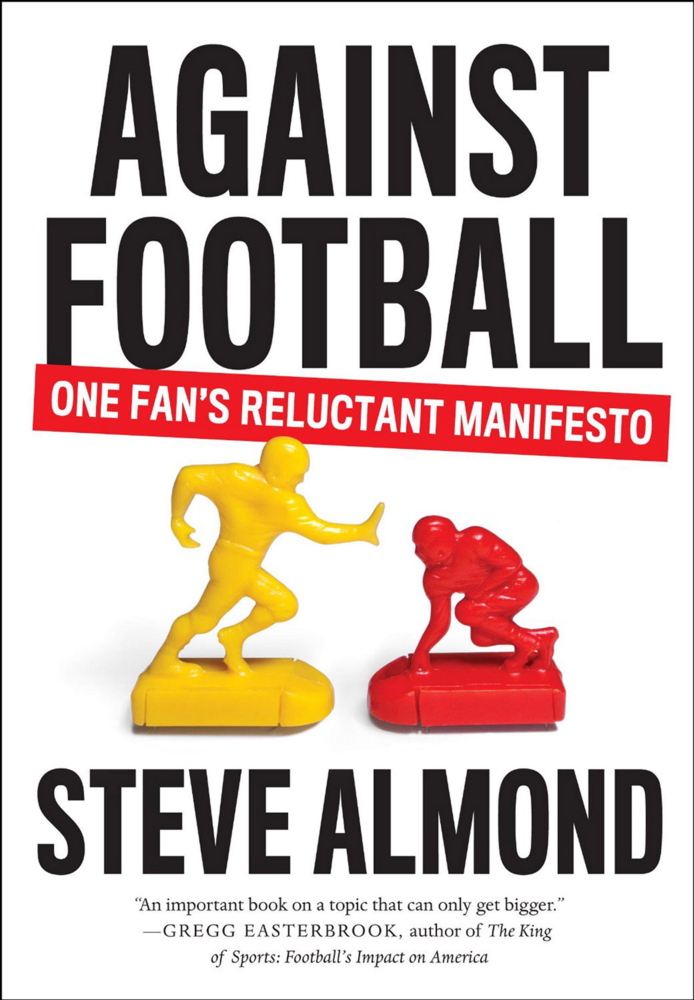In 1978, 11-year-old Steve Almond was watching his beloved Oakland Raiders play a pre-season game against the New England Patriots. Along with millions of other TV viewers, he saw Darryl Stingley dive for a pass, only to be flattened by Jack “The Assassin” Tatum.
As Stingley lay motionless on the field, soon to be deemed paralyzed, Almond feared this would be the end of football. Yet, he was proud of Tatum’s ability to crush the opponent. Even at the age of 11, Almond realized that part of his zeal for the sport came from “the thrill of such violent transactions.”
So began the evolution of an avid and principled fan whose misgivings about the sport would continue to haunt him.
Almond’s pitch-perfect new book chronicles not only his lifelong passion for the gridiron, but the pesky moral and medical issues that have dogged it – and him – for decades. “Against Football: One Fan’s Reluctant Manifesto” is a quirky, improbable mash-up. It combines business, science, memoir, history and rant. The result is a cultural celebration and lament that centers on our most popular professional sport.
Almond, a critically acclaimed Boston-area author, former sports reporter and middle-age dad, has done his homework. He explores the seemingly endless ways in which football intersects American life. Presidents throughout the years have weighed in on the topic, from Teddy Roosevelt’s efforts to urge reform, to Richard Nixon’s obsessive fandom, to Barack Obama’s dictum that if he had a son he wouldn’t let him play professional football.
The author considers the brutal nature of the game, with its tendency to incur all manner of injury. He interviews medical researchers and cites studies on the irrefutable links between concussions and brain damage. Add big business and money to the mix, courtesy of the NFL, factor in television, with its cameras lingering over on-field collisions, and we now have what Almond dubs “football porn.”
The violence of the game becomes cinematic and seductive, fueling our most aggressive instincts.
Almond loads the book with provocations that will ruffle more than a few fans: He conflates football with war, saying it’s “the one sport that most faithfully recreates our childhood fantasies of war as a winnable contest.” He blasts sportscasters for whitewashing the savagery of the game as they “stage-manage our experience” of watching it. And he derides the NFL’s nonprofit status.
Among the reasons “Against Football” works so well is that Almond never loses sight of his role. Amid all the data and facts, he is first and foremost a fan. He understands that football is the currency of American boyhood, a bond shared by fathers and sons and among communities of fans. He recognizes that football is, for many players, a way out of poverty. And he views the game as a metaphor for winning and losing – our lives writ large on an alternate stage.
“This little book is a manifesto,” Almond says. “Its job is to be full of obnoxious opinions.” He knows he walks a fine line claiming “our allegiance to football legitimizes and even fosters within us a tolerance for violence, greed, racism, and homophobia.” So, when he encounters people watching football at a bar, in a sports-induced reverie, he apologizes for his dark, unpopular views. He really is sorry for raining on their parade. He just wants people to understand that unfettered fandom is a form of collusion that allows the sport to continue unchanged.
“Against Football” is, at bottom, a love letter from a heartbroken fan, notable for his eloquence and clarity. It’s easy to imagine that this pungent critique, with quotable passages on nearly every page, could be a much-needed game-changer. If that’s overly optimistic, then we’ll have to settle for a first-rate piece of journalism and a great read.
Joan Silverman writes op-eds, essays and book reviews. Her work has appeared in The Christian Science Monitor, Chicago Tribune and Dallas Morning News.
Copy the Story LinkSend questions/comments to the editors.



Success. Please wait for the page to reload. If the page does not reload within 5 seconds, please refresh the page.
Enter your email and password to access comments.
Hi, to comment on stories you must . This profile is in addition to your subscription and website login.
Already have a commenting profile? .
Invalid username/password.
Please check your email to confirm and complete your registration.
Only subscribers are eligible to post comments. Please subscribe or login first for digital access. Here’s why.
Use the form below to reset your password. When you've submitted your account email, we will send an email with a reset code.